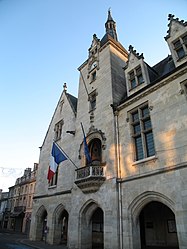Libourne
| Libourne | ||
|---|---|---|

Town hall
|
||
|
||
| Coordinates: 44°55′N 0°14′W / 44.92°N 0.24°WCoordinates: 44°55′N 0°14′W / 44.92°N 0.24°W | ||
| Country | France | |
| Region | Nouvelle-Aquitaine | |
| Department | Gironde | |
| Arrondissement | Libourne | |
| Canton | Libourne | |
| Intercommunality | Libournais | |
| Government | ||
| • Mayor (2014–2020) | Philippe Buisson (PS) | |
| Area1 | 20.63 km2 (7.97 sq mi) | |
| Population (2012)2 | 23,736 | |
| • Density | 1,200/km2 (3,000/sq mi) | |
| Time zone | CET (UTC+1) | |
| • Summer (DST) | CEST (UTC+2) | |
| INSEE/Postal code | 33243 / 33600 | |
| Elevation | 2–28 m (6.6–91.9 ft) (avg. 15 m or 49 ft) |
|
|
1 French Land Register data, which excludes lakes, ponds, glaciers > 1 km² (0.386 sq mi or 247 acres) and river estuaries. 2Population without double counting: residents of multiple communes (e.g., students and military personnel) only counted once. |
||
1 French Land Register data, which excludes lakes, ponds, glaciers > 1 km² (0.386 sq mi or 247 acres) and river estuaries.
Libourne (French pronunciation: [libuʁn]; Gascon: Liborna pronounced [liˈbuɾnɔ]) is a commune in the Gironde department in Nouvelle-Aquitaine in southwestern France. It is a sub-prefecture of the department.
It is the wine-making capital of northern Gironde and lies near Saint-Émilion and Pomerol.
Libourne is located at the confluence of the Isle and Dordogne rivers.
In 1270, Leybornia was founded as a bastide by Roger de Leybourne (of Leybourne, Kent), an English seneschal of Gascony, under the authority of King Edward I of England. It suffered considerably in the struggles of the French and English for the possession of Gironde in the 14th century, and joined France in the 15th century.
In December 1854 John Stuart Mill passed through Libourne, remarking "I stopped at Libourne as I intended & had a walk about it this morning quite the best thing there is the bridge of the Dordogne, the view from which is really fine".
...
Wikipedia



